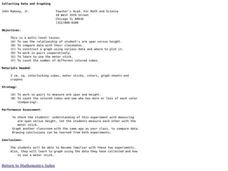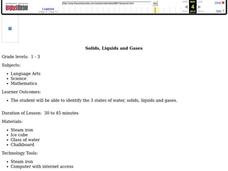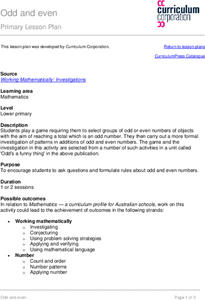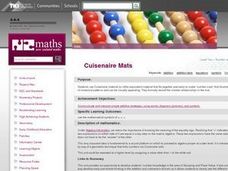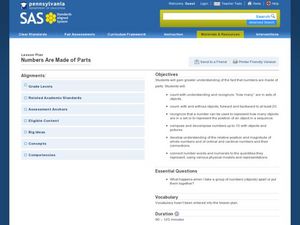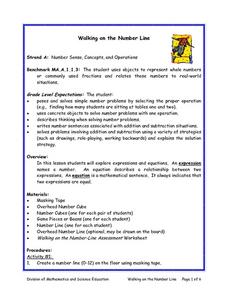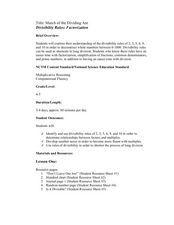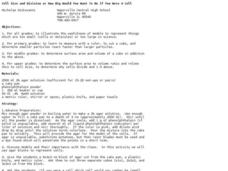Curated OER
Length and Volume Exploration
Students explore how to measure length and volume. They compare and order objects according to their measurable attributes and measure items using non-standard units. Students put 4 pencils in order from shortest to longest after...
Curated OER
Collecting Data and Graphing
Young mathematicians collect data and graph it. They work collaboratively to collect data regarding the span of arm length versus height and graph the data they collect.
Curated OER
Solids, Liquids and Gases
Students explore solids, liquids, and gases. In this states of water lesson plan, students conduct a scientific investigation that requires them to observe and note the differences among solid, liquids, and gases.
Curated OER
Area And Perimeter Using Pentominoes
Third graders engage in an enrichment lesson exploring the concepts of area and perimeter. They construct new pentominoes that are 3 times the size of normal ones and then identify the area and perimeter measurements. They then create a...
Curated OER
It's About Time
First, second, and third graders explore elapsed time through estimation and prediction. They work with a partner to estimate how long it will take to perform various tasks. One person uses a stop watch to time his or her partner...
Curated OER
Odd and even
Learners play a game requiring them to select groups of odd or even numbers of objects with the aim of reaching a total which is an odd number. They carry out a more formal investigation of patterns in additions of odd and even numbers.
Curated OER
Linear, Square, and Cubic Units
Linear, square, and cubic units are all investigated as different types of packages are measured. The teacher will need supplies such as a box of aluminum foil, a package of ribbon, and a bag of mulch. The class determines the...
Curated OER
Cuisenaire Mats
First graders use Cuisenaire rods to study the mathematical symbols =, <, > for the relationships is equal to, is less than, and is greater than. They use the rods to show visual explanations of common number combinations.
Curated OER
Castles On The Ground (2D & 3D Shapes)
Explore the relationship between 2D and 3D shapes by having your class view representation of shapes and investigate their symmetry. They will create a solid object from diagrams and describe the reflection or rotational symmetry. In the...
Curated OER
Cap-It to the Max
Eighth graders compare the volume of three cylinders constructed from the same size sheet of paper. They use concrete and graphical models to derive formulas for finding perimeter, circumference, area, and volume of two and three...
Pennsylvania Department of Education
Numbers Are Made of Parts
Children play with barnyard animal cards to practice composing and decomposing numbers. With their "secret number" of animal cards in a cup, they shake and spill them onto a barn story board, counting how many animals fall in the barn...
Curated OER
Measurement (Grades 3-5)
Third, fourth, and fifth graders participate in measurement centers. They visit six different centers: standard and linear measurement, clocks, weight, volume, temperature, and converting measurements. They complete a data collection...
National Council of Teachers of Mathematics
The Roll Out Fractions Game: Comparing Fractions
Reinforce the concept of comparing fractions with a hands-on, two-player game that calls for a visual model, score board, and dice. Players roll dice to acquire their given fraction, create the fraction using fraction tiles, then compare...
Virginia Department of Education
Relationships Round Robin
Mathematics is all about patterns. Young mathematicians analyze geometric patterns to write algebraic expressions. They use the expressions to predict future stages of the patterns.
Curated OER
Olympics (Grade 4)
Young scholars research information about the current Olympic research. In this Olympic research lesson, students take a pre-test to determine their knowledge about the current Summer Olympics. They choose one of three areas to research...
Curated OER
Walking On The Number Line
Students investigate the concepts of expressions and equations while defining the similarities and differences. They explore the operations by using a number line and record answers while working with the teacher. Students play the game...
Curated OER
Terror in Space
Students view a video clip about the role of satellites in space. They examine the concept of center of mass. They participate in an experiment showing how altering the location of an object's center of mass can change its motion.
Curated OER
Presidents
Learners conduct a research project. In this United States Presidents lesson, students draw a presidents name out of a box and complete a research activity on their president. Research options include writing a two page paper, create a...
Curated OER
Factoring
Ninth graders factor equations and find prime numbers. In this algebra lesson, 9th graders find the factors and prime factors of a number using multiples and relatively prime numbers.
Curated OER
Calorimetry
Students investigate calorimetry and set up equipment to measure calories. In this calorimetry lesson plan, students make a calorimeter and compare large amounts of heated water with small amounts to show the difference in calories....
Curated OER
Density - An Introduction
Students experiment with objects of different densities. In this density lesson, students examine same-sized objects with different weights, then look at a teacher explanation of density. Students make wave bottles and a density jar to...
Curated OER
Hot Air Balloons
Students examine how a hot air balloon works. In this hot air balloon lesson, students do an experiment to test the effects of heat on density. Students make their own hot air balloon and act out how nitrogen moves when turned to a liquid.
Curated OER
March of the Dividing Ant
Young scholars inspect divisibility rules. In this divisibility rules lesson, students study the relationship between factorization and the divisibility rules for 2, 3, 5, 6, 9, and 10. Young scholars read One Hundred Hungry Ants and A...
Curated OER
Cell Size and Division or How Big Would You Want To Be if You Were a Cell?
Students investigate why cells divide. In this cell size lesson plan, students observe how far a solution travels into 3 different size model cells of agar. They answer questions about the most effect movement of "nutrients" into the...
Other popular searches
- Cubing Strategy Math
- Cubing Strategy for Science
- Lesson Plan Cubing Strategy
- Cubing Strategy Lesson Plans



